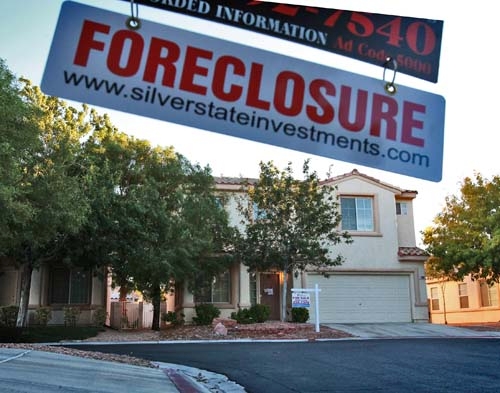Majority of Nevada home sales are foreclosures

Nevada led all states with foreclosure sales accounting for nearly 57 percent of all home sales, RealtyTrac said Thursday.
Several other states had foreclosure sales that made up at least 20 percent of all homes purchased in the third quarter: California, Arizona, Georgia, Colorado and Michigan.
The Las Vegas Greater Association of Realtors has pegged the percentage of foreclosure sales in 2011 a little lower at 46.8 percent.
Foreclosures made up a smaller slice of all U.S. homes sold in last year’s third quarter, as banks delayed placing properties for sale and home sales slowed.
Despite the decline, foreclosures still represented 20 percent of all homes sold in the July-September period, about four times more than at the height of the housing boom, according to foreclosure listing firm RealtyTrac Inc.
Foreclosure sales include homes purchased after they received a notice of default or were repossessed by lenders.
John Boyer, Las Vegas attorney and foreclosure mediator, said foreclosure notices have slowed to a trickle as a result of a Nevada law that took effect in October requiring that lenders provide affidavits of authority to foreclose.
“I know there has been some discussion about banks and loan service companies figuring this out, but I think what they are going to figure out is compliance is not possible,” Boyer said. “Adding to the problem is the opacity of the process at the banks and loan service companies. One of the primary technical problems is reuniting the promissory note with the deed of trust. Unless written endorsements of the note are made, it is just not going to happen.”
Some real estate agents in Las Vegas believe the law, introduced as Assembly Bill 284 in the 2011 Legislature, has been more of a hindrance for housing market recovery, delaying the inevitable process of foreclosure or short sale.
“That’s false,” Nevada Attorney General Catherine Cortez Masto said Thursday. “I think it’s working just as it should.
“There was widespread robo-signing and that has stopped. Banks are changing the process, and three, there is nothing new in the law that didn’t already exist, other than changing the enforcement mechanism from a misdemeanor to a felony.”
The law ensures that foreclosure documents are legitimate, Cortez Masto said. Any decrease in notice of default filings tells her that some documents were illegally and materially modified.
The problem remains that multiple holders of the note and deed of trust have to prove they have authority to foreclose, attorney Boyer said.
Ex-post facto laws are not going to help, he said.
“Houses will have no value if the defaulting owner does not have to pay the mortgage or leave,” Boyer said. “How do you sell a house if title still shows a deed of trust that cannot be foreclosed? The only solution is a judicial foreclosure or quiet title action, which costs a large amount of money and can take years with right of redemption.”
The suggestion of reducing principal balance as a solution is “fools gold,” the attorney said.
“Does anyone seriously think that the deed of trust and note holder can legally cure the title problem by reducing the balance on a flawed note and deed of trust? When there is a new default, the issue is still there,” Boyer said. “The truth is we may need a whole new branch or division of courts to sort through all the title problems. The nonjudicial foreclosure process worked just fine until it was abused. Now hardly anyone has confidence in the system.”
Housing industry experts anticipate the delay in foreclosures will change swiftly once the investigations are resolved. They note the glut of bank-owned homes and others already in some stage of foreclosure.
“As the foreclosure industry gets clarity on the foreclosure process, they will be able to push more of these foreclosures to sale,” said Daren Blomquist, a vice president at RealtyTrac.
The Associated Press contributed to this report.